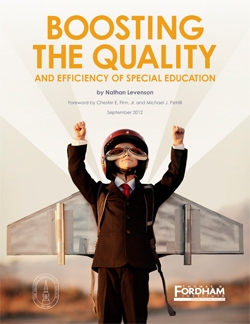Districts could save $10 billion, improve results, by shifting special-education staffing to national median
Tyson EberhardtFordham's latest report offers insights in to how to boost the quality and efficiency of special education
Flap in Virginia shows reformers’ fealty to ideology over implementation
Michael J. PetrilliWe need accountability systems that create urgency and push for significant gains every year. Ideological arguments and utopian objectives don’t help.
First bell: 9-4-12
Tyson EberhardtA first look at education news from the long weekend and this morning
First bell: 8-31-12
Tyson EberhardtA first look at this morning's education news: Jeb talked ed reform, the GOP is divided on Common Core, and more
Exam Schools: The Ups and Downs of Selective Public High Schools
The plight of low-performing students dominates our education news and policies. Yet America’s high flyers demand innovative, rigorous schooling as well, particularly if the country is to sharpen its economic and scientific edge. Motivated, high-ability youngsters can be served in myriad ways by public education, including schools that specialize in them. In a new book from Princeton University Press, Exam Schools: Inside America's Most Selective Public High Schools, co-authors Chester Finn and Jessica Hockett identify 165 such high schools across America. In this Fordham LIVE! conversation, they and others will examine some of the issues that selective-admission public high schools pose. Who attends them? How are their students selected? Are such schools the future of gifted education or do they unfairly advantage a select few at the expense of most students? Just how different are they, anyway?
First bell: 8-30-12
Tyson EberhardtA first look at today's education news: Virginia starts over with its NCLB-waiver goals, California looks to overhaul pensions, and more
Vouchers − Darwin= ??
Chester E. Finn, Jr.Let there be controversy
Leadership lessons from a brazen cheating scandal
Gregg VanourekKeeping ethics and results aligned
First bell: 8-29-12
Tyson EberhardtA first look at this morning's education news: Chris Christie takes on teacher unions at the RNC, the GOP's education platform is out, and more
Boosting the Quality and Efficiency of Special Education
Nathan LevensonThis groundbreaking study uses the largest database of information on special education spending and staffing ever assembled to uncover significant variance in how districts staff for special education. The report concludes that if the high-spending districts studied reduce their staffing in this area to the national median the public could save $10 billion and offers clear recommendations for improving special-education quality and efficiency.
First bell: 8-27-12
Tyson EberhardtA first look at the education news from the weekend and this morning
The 30 top education policy tweeters, 2012
Michael J. PetrilliA year ago, I compiled a list of the top education policy tweeters, as measured by Klout.com. Here's the latest and greatest list, circa 2012.
First bell: 8-23-12
Tyson EberhardtA first look at today's education news: Obama challenges Romney on edu-spending, CA students make the grade, and more
Raising the floor, but neglecting the ceiling
Chester E. Finn, Jr., Jessica HockettGifted education, selective public schools, and the troubles of one of America's best high schools
First bell: 8-22-12
Tyson EberhardtA first look at today's education news: the PDK / Gallup poll is out, the Obama campaign releases an education ad, and more.
First bell: 8-21-12
Tyson EberhardtA first look at today's education news: Obama takes on the Ryan education plan, Ohio delays the release of report cards, and more.
Paul Ryan and the education lobby’s suicide march to fiscal oblivion
Michael J. PetrilliJust as Scott Walker’s purportedly “anti-educator” reforms freed up money in his state for more spending in the classroom, so would Paul Ryan’s “radical” reforms free up money for education nationwide.
First bell: 8-20-12
Tyson EberhardtA first look at education news from the weekend and this morning: Obama on teacher jobs, the latest in the Adelanto saga, and upscale Catholic schools.
America’s athletics vs. academics: The results might surprise you
Michael J. PetrilliDoes the U.S. produce more elite athletes or high-performing students?


